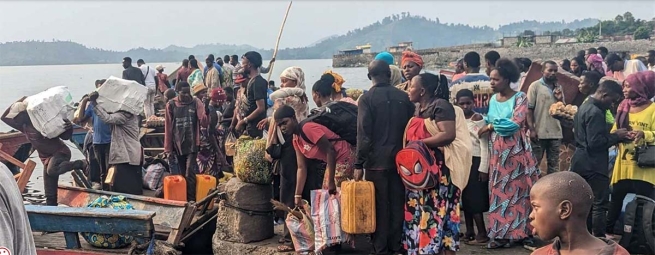Salesian missionaries are doing well, but are struggling to send updates because there is no electricity and no internet. The latest news is from Tuesday, and reports:
‘Since 2am we have been under a hailstorm of bullets, we don't know how to get out of our homes’,
‘There is a lack of food and water, all the displaced people no longer know where to run, the situation is catastrophic,’ adds a volunteer from the Salesian NGO “Volontariato Internazionale per lo Sviluppo - VIS”.
Below is the text of the letter sent a few days ago by the Salesians in Goma:
‘This is no news to you, but this sad reality sees families in the Masisi territory, a vulnerable population that has endured many wars and guerrilla warfare in recent decades, still forced to move because of gunfire in the villages where they live. Until 9 January 2025, the administrative and political situation in central Masisi has been very complex, as evidenced by the large number of people travelling to various places of refuge. In addition to several masses of people crowding the city of Goma and its surroundings, there are displaced people from Rutshuru and Nyiragongo territories due to the clashes that have intensified in Masisi and Kalehe territory in South Kivu.
Goma is becoming a crossroads of displaced people. Women and children, along with young men, are most at risk. Many children and young people in primary and secondary schools see their school year interrupted by this war situation. All this also affects the agricultural season, as it is a crucial time to sow seeds, in the hope of a harvest to feed the people who live not only in rural areas but also, and especially, to supply urban areas such as the city of Goma.
More than two years have already passed since the opening of the IDP camps surrounding the city of Goma, and it is said that aid workers are not always able to meet all the needs of the displaced people in the numerous camps. The current political instability means that the city of Goma does not have sufficient supply opportunities, especially since most of the population does not have access to food.
Another sad reality is that there are some poor families from different areas who, due to previous wars, have settled in the outskirts of Goma and who, as a sign of solidarity, are now forced to take in other families from conflict zones, even though these families had not adapted very well to life in the city and were living in vulnerable conditions. In general, it is rare to find direct humanitarian aid for these families, as they live in a very hidden area in the suburbs and boulevards of the city of Goma.
Some families, once they arrive in Goma, enrol their children immediately in school in an attempt to save the current school year, but they have neither the school materials nor the financial resources to pay the required school fees. Moreover, the schools have a very limited capacity, due to a lack of space, desks or teaching materials'.
This is how the letter sent by the Salesians before the occupation of Goma by the rebels ends, testifying to an extremely precarious humanitarian and educational situation.
For more information, visit: www.missionidonbosco.org


